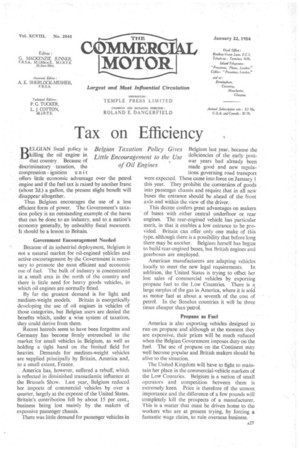Tax on Efficiency
Page 29

If you've noticed an error in this article please click here to report it so we can fix it.
BELG1AN fiscal policy is killing the oil engine in that country. Because of discriminatory taxation, the compression ignition unit offers little economic advantage over the petrol engine and if the fuel tax is raised by another franc (about 2d.) a gallon, the present slight benefit will disappear altogether. , Thus Belgium encourages the use of a less efficient form of power. The Government's taxation policy is an outstanding example of the harm that can be done to an industry, and to a nation's economy generally, by unhealthy fiscal measures. It should be a lesson to Britain, Government Encouragement Needed Because of its industrial deployment, Belgium is not a natural market for oil-engirted vehicles and active encouragement by the Government is necessary to promote the most efficient and economic use of fuel. The bulk of industry is concentrated in a small area in the north of the country and there is little need for heavy goods vehicles, in which oil engines are normally fitted.
By far the greatest demand is for light and medium-weight models. Britain is energetically developing the use of oil engines in vehicles of those categories, but Belgian users are denied the benefits which, under a wise system of taxation, they could derive from them.
Recent hatreds seem to have been forgotten and Germany has become firmly entrenched in the market for small vehicles in Belgium, as well as holding a tight hand on the limited field for heavies. Demands for medium-weight vehicles are supplied principally by Britain, America and, to a small extent, France.
America has, however, suffered a rebuff, which is reflected in diminished transatlantic influence at the Brussels Show. Last year, Belgium reduced her imports of commercial vehicles by over a quarter, largely at the expense of the United States. Britain's contribution fell by about 15 per cent., business being lost mainly by the makers of expensive passenger chassis.
There was little demand for passenger vehicles in Belgium last year, because the deficiencies of the early postwar years had already been made good and new regulations governing road transport were expected. These came into force on January 1 this year. They prohibit the conversion of goods into passenger chassis and require that in all new buses the entrance should be ahead of the -front axle and within the view of the driver.
This decree confers great advantages on makers of buses with either central underfloor or rear engines. The rear-engined vehicle has Particular merit, in that it enables a low entrance to be provided. Britain can offer only one make of this type, although there is a poSsibility that before long there may be another. Belgium herself has begun to build rear-engined buses, but British engines and gearboxes are employed.
American manufacturers are adapting vehicles locally to meet the new legal requirements. In addition, the United States is trying to offset her lost sales of commercial vehicles by exporting propane fuel to the Low Countries. There is a large surplus of the gas in America, where it is sold as motor fuel at about a seventh of the cost of petrol. In the Benelux countries it will be three times cheaper than petrol.
Propane as Fuel America is also exporting vehicles designed to run on propane and although at the moment they are expensive, their prices will be much reduced when the Belgian Government imposes duty on the fuel. The use of propane on the Continent may well become popular and British makers should be alive to the situation.
The United Kingdom will have to fight to maintain her place in the commercial-vehicle markets of the Low Countries. Belgium is a nation of small operators and competition between them is extremely keen. Price is therefore of the utmost importance and the difference of a few pounds will completely kill the prospects of a manufacturer. This is a matter that must be driven home to the workers who are at present trying, by forcing a fantastic wage claim, to ruin overseas business.




























































































